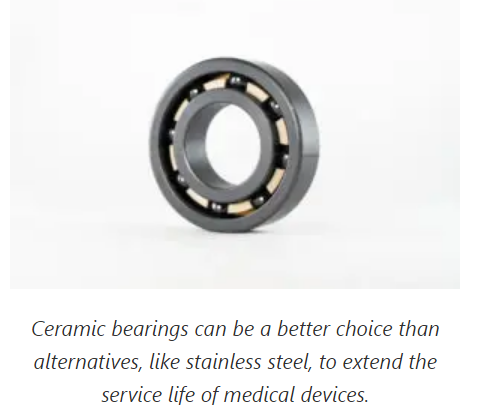Smallest possible bearings

Aside from materials, the high-precision bearing’s design should also be considered. Generally, medical device OEMs must develop their products to function well in a limited space. This equipment requires the smallest possible bearings to fit, particularly for handheld devices. For such applications, SMB Bearings recommends stainless steel miniature bearings, defined by the inner diameter being under 10 millimeters. However, the smallest bearing in SMB Bearings’ miniature range is designed to fit a shaft just 0.6 millimeters in diameter — roughly the size of a pinhead.
For rotational handheld medical equipment, such as dental drills, bearings may need to work at high speeds. A bearing with a 0.6 millimetre bore can deliver 160,000 revolutions per minute (rpm), giving an impressive capacity for rotational speed, while some larger bearings can have their speed rating increased by the use of ball retainers, made from materials such as torlon or reinforced polyamide.
If rotational accuracy is important to the application — usually the case with medical instruments — manufacturers must consider choosing a precision branded bearing. There are plenty of low-cost bearings on the market, but their accuracy and inconsistent quality make them dangerously unsuitable for high-precision applications.
Good lubrication
Next, let’s look at bearing lubrication requirements in medical applications. Ceramic bearings do not require a lubricant to operate, whereas steel alternatives may need routine maintenance to relubricate the part. In these instances, good lubrication is also vital to bearing performance in medical applications, and to ensuring patient safety. For instance, for bearing systems that rely on grease lubrication it’s recommended that the lubrication is biocompatible, so there is no risk to the patient’s health even if the equipment comes into contact with skin or tissue.
Indeed, lubricants graded H1 or H2 by the National Sanitation Foundation (NSF) are typically recommended for medical devices. H1 lubricants are tasteless, odorless, and classified as safe for human consumption. They are used in machinery like pumps, conveyor belts and mixers, and even food preparation environments where contact with the food is technically unavoidable. H2 lubricants are recommended for devices that don’t come in direct contact with food, beverages or pharmaceutical products.
Medical device OEMs should also consider biocompatible lubricants that meet ISO 10993, a series of standards for evaluating the biocompatibility of medical devices to manage biological risk.
The above examples show that precision bearings in medical devices are integral to ensuring patient safety. However, with the support of an expert specialist bearings supplier, OEMs needn’t feel the burden of stipulations like ISO 14971. Instead, they can make the right choice of bearing material and design to ensure medical devices remain operational and pass inspections — and, most importantly, help safeguard patients’ safety well into the future without the need for recalls.
1.The news above mentioned with detailed source are from internet.We are trying our best to assure they are accurate ,timely and safe so as to let bearing users and sellers read more related info.However, it doesn't mean we agree with any point of view referred in above contents and we are not responsible for the authenticity. If you want to publish the news,please note the source and you will be legally responsible for the news published.
2.All news edited and translated by us are specially noted the source"CBCC".
3.For investors,please be cautious for all news.We don't bear any damage brought by late and inaccurate news.
4.If the news we published involves copyright of yours,just let us know.
Next Bearings for improved patient safety
BRIEF INTRODUCTION
Cnbearing is the No.1 bearing inquiry system and information service in China, dedicated to helping all bearing users and sellers throughout the world.
Cnbearing is supported by China National Bearing Industry Association, whose operation online is charged by China Bearing Unisun Tech. Co., Ltd.
China Bearing Unisun Tech. Co., Ltd owns all the rights. Since 2000, over 3,000 companies have been registered and enjoyed the company' s complete skillful service, which ranking many aspects in bearing industry at home and abroad with the most authority practical devices in China.



